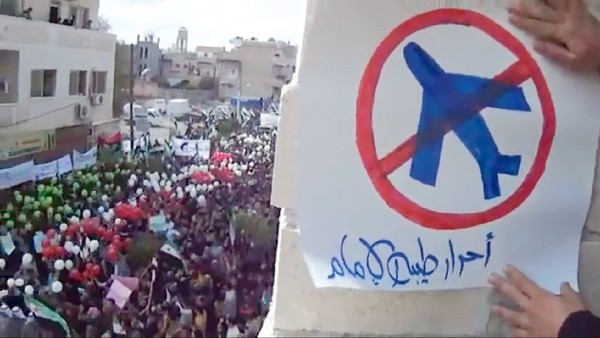Syria Opinion: Why There Should --- And Will --- Be a No-Fly Zone
See Also, Syria, Egypt (and Beyond) Liveblog: A United Front
 With each passing day, the reasons for avoiding intervention in Syria are falling by the wayside. The conflict is escalating, the humanitarian crisis is deepening, the opposition is organising, and the geopolitical situation is becoming more favourable.
With each passing day, the reasons for avoiding intervention in Syria are falling by the wayside. The conflict is escalating, the humanitarian crisis is deepening, the opposition is organising, and the geopolitical situation is becoming more favourable.
A no-fly zone is finally --- and clearly --- advantageous to the Syrian people.
First, a look back at the world's response, to be vindicated by history, to the crisis in Libya. Here was a case where the advocacy of the support of democracy, not only for humanitarian and moral reasons but as a geopolitical strategy, could take effect. US officials had eventually understood that the Arab Spring could undo threats to regional and world security --- significantly and ironically, spurred by the US in the previous decade. The "domino effect," the misguided declaration of the Iraq War that this was the start of a chain of liberating events was finally coming true, but not at the hands of the American military.
Secretary of State Hillary Clinton realised this, perhaps too late for some, but in time to convince President Obama, who convinced NATO and the UN, who launched the no-fly zone that empowered the National Transitional Council's fighters and led to the toppling of Muammar Qaddafi. In March, I wrote that Clinton understood that Qaddafi "wasn't bombing a rebellion, he was bombing a movement". The American support of that movement, in co-ordination with the Arab League, European partners, and the United Nations, would be vital in ensuring Qaddafi did not bomb the spirit of the Arab Spring into submission.
And success in Libya has helped reignited protests, particularly in Yemen and Syria. With each advance against Qaddafi, other movements took heart, and with the fall of a man who had dominated for 42 years, the Free Syrian Army picked up new recruits, the Syrian protesters took the mantle of wave for reform and right, and President Assad took his place as the next domino.
On Thursday, the revelation was that the Free Syrian Army, the defected soldiers who make up the militant arm of the opposition, had agreed to coordinate its efforts with the Syrian National Council, a group of dissident political leaders headed by expatriates. The SFA, an organization with respect in the streets but which had been condemned by the opposition's political leaders for advocating violence, was finally recognised by the opposition leaders, as it vowed restraint. The SNC, an organisation which had struggled to achieve legitimacy across a range of opposition movements, will now likely be recognised as the official political arm by many, with the SFA as its the military wing. Finally, the opposition has the strength, the recognition, the organization, and the unity that it has been seeking. This could allow international players to anchor their efforts in the sky to a political and a military effort on the ground.
While this new opposition has vowed to protect civilians and only fire in self-defence, the regime, which will not suffer a rival, will continue attacks against those civilians and dissenters. The only way to stop this will be to chip away at President Assad's military.
Defections are on the rise, and those quitting the regime's forces are reporting that there are many more who would join the opposition if they had a degree of protection. In the last few weeks, defectors from an armoured division blew up five of their tanks rather than taking them with them after they realized that if they did not flee on foot, the Syrian Air Force would destroy the vehicles anyway. Within an hour of the first report, warplanes were reported in the area.
The defecting soldiers are calling for a no-fly zone, the protesters in the streets are calling for it, human rights activists are requesting it, and the prospect of mass defections is encouraging for it.
Turkey, France, and Jordan (reluctantly) have come to this conclusion. Turkish Prime Minister Recep Erdogan has come to understand that if he is not the champion of resistance to Assad, he could be its victim. His border is threatened, a major trade route is blocked by chaos, his territory is increasingly flooded with refugees, and one of his major allies is now a liability.
Erdogan, in his push for a no-fly zone, needed an Arab State to join him. He found it in Jordan, scared of a dragged-out crisis on its doorstep. France takes the lead for Europe, after the boost of its victory in Libya, and a President who wants to show his population that he is willing to fight for freedom in the Middle East. The prospect grows that the European Union and Arab League will give tacit approval (at least), as more nation-states realise that they can either topple the Assad regime or risk the consequences of not doing so.
The moral reasons for a no-fly zone have only grown as the humanitarian crisis has worsened. The geopolitical incentives are stronger than ever. Now the logistical and practical possibilities are emerging.
There will be a no-fly zone, with or without US participation. Turkey wants it, France is chomping at the bit for it, and at the end of the day the rest of the world will realize that there is at least one more domino that needs to fall.

 Friday, December 2, 2011 at 4:21
Friday, December 2, 2011 at 4:21
Reader Comments